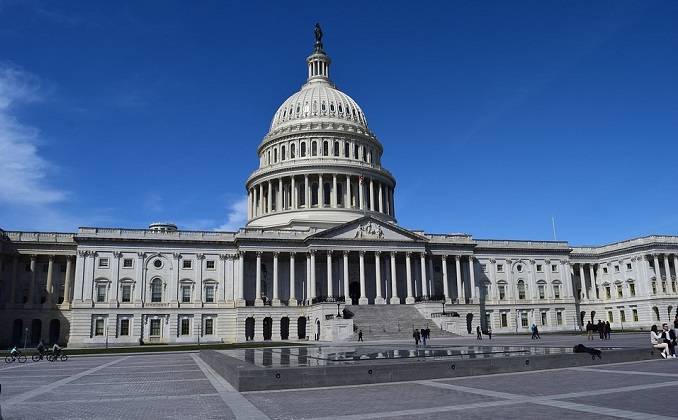Win Without War’s FY2020 National Defense Authorization Act (NDAA) Priorities

Last Updated on February 2, 2021.
By the end of September, the House and Senate are expected to conference their respective versions of the Fiscal Year 2020 National Defense Authorization Act (H.R. 2500 and S.1790). As they do so, Win Without War has sent a letter to the relevant Congressional decision-makers regarding our priorities. Below are some of the highlights. You can also see the full 7-page letter here!
Preventing a U.S. attack on Iran and supporting U.S. diplomacy with Iran
For more than two years, the United States has taken one reckless action after another—from violating the Joint Comprehensive Plan of Action and imposing crippling economic sanctions that hurt ordinary Iranians to taking the unprecedented step of designating parts of Iran’s military as terrorists and sanctioning Iran’s top diplomat. All of these actions put us one step closer to another disastrous war of choice in the Middle East that analysts say would dwarf the cost of the 2003 Iraq invasion in both blood and treasure.
Relevant sections in H.R. 2500
- Sec. 1229, which would simply prevent the administration from starting an unauthorized war with Iran, consistent with the Constitution and the War Powers Resolution of 1973. It also makes clear that neither the 2001 or 2002 authorizations for use of military force provide legal authority for a U.S. war against Iran. A similar amendment to S.1790 received bipartisan majority support while failing to meet a 60-vote threshold for passage.
Ending all U.S. support for and assistance to the Saudi-led coalition in Yemen
The United States must end all political and military support for Saudi Arabia and the United Arab Emirates (UAE)’s military intervention in Yemen. The Saudi/Emirati coalition’s destruction of schools and hospitals, indiscriminate targeting of civilians, and use of starvation as a weapon of war has helped make Yemen home to the world’s largest humanitarian crisis. Already Congress has voted numerous times to end arms sales and military assistance to the coalition, forcing four vetoes by the president.
Relevant sections in H.R. 2500
- Sec. 1099X, which would prohibit the export of air to ground munitions, related components and parts of such munitions, and related services to Saudi Arabia and the United Arab Emirates. This would capture precision-guided munitions, which have been used by the Saudi/Emirati-led military coalition to kill and injure thousands of civilians in Yemen with impunity.
- Sec. 1270H, which would prohibit U.S. military assistance and support for the military campaign against the Houthis, including logistics and intelligence sharing considered indispensable for coalition airstrikes. Former CIA agent Bruce Riedel, Senior Fellow at the Brookings Institution, has argued that the coalition’s aerial bombing campaign in Yemen “will be grounded” if the United States “halts the flow of logistics.”
Preventing discrimination by the military and militarization of the border
The U.S. military has a responsibility to uphold the civil rights of those who sign up to serve and pay the ultimate price in defense of the United States. Congress also must work to prevent further militarization of the U.S. southern border.
Relevant sections in H.R. 2500
- Sec. 530B, which would safeguard the right of all people, regardless of race, religion, national origin, or sex – including sexual orientation or gender identity – to serve openly in the Armed Forces, so long as they meet gender-neutral standards. This section would block President Trump’s April 2019 cruel and hateful executive order banning military service by transgender people by preventing the military from using factors related to gender identity when making recruitment and retention decisions.
- Sec. 1046, which would prohibit the president from using any Department of Defense funds for the construction of his inhumane and hateful border wall.
Stopping new nuclear weapons and supporting nuclear arms control
The Trump administration is pushing for a dangerous new “low-yield” warhead on a submarine-launched ballistic missile – a nuclear weapon considered by the administration to be a war-fighting tool. This weapon, the recent move to end the Intermediate Range Nuclear Forces Treaty, and reports that the administration does not want to take the commonsense option of extending the New Strategic Arms Reduction Treaty (New START) will fuel the worsening nuclear arms race and put us closer to the brink of nuclear war.
Relevant sections in H.R. 2500
- Sec. 1646, which would prohibit funds from being used for the deployment of the unnecessary and dangerous W76-2 low-yield warhead and would eliminate the $19.6 million DoD request and $10 million NNSA request for the program.
Read our letter to Congress on all of our NDAA priorities
Want to get more involved? Check out our progressive foreign policy recess guide and head to your Congressperson’s town hall today!
Can’t go to a town hall this August? Your Representative and Senators still want to hear from you so give them a call at (202) 224-3121 and tell them what foreign policy and national security issues you care about!
August 20, 2019
